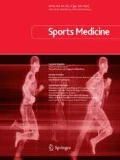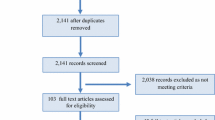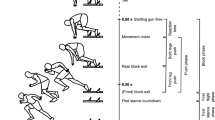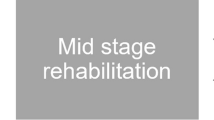Abstract
Sports injuries are one of the most common injuries in modern western societies. Treating sports injuries is often difficult, expensive and time consuming, and thus, preventive strategies and activities are justified on medical as well as economic grounds.
A successful injury surveillance and prevention requires valid pre- and post intervention data on the extent of the problem. The aetiology, risk factors and exact mechanisms of injuries need to be identified before initiating a measure or programme for preventing sports injuries, and measurement of the outcome (injury) must include a standardised definition of the injury and its severity, as well as a systematic method of collecting the information. Valid and reliable measurement of the exposure includes exact information about the population at risk and exposure time. The true efficacy of a preventive measure or programme can be best evaluated through a well-planned randomised trial.
Until now, 16 randomised, controlled trials (RCT) have been published on prevention of sports injuries. According to these RCT, the general injury rate can be reduced by a multifactorial injury prevention programme in soccer (relative risk 0.25, p < 0.001, in the intervention group), or by ankle disk training, combined with a thorough warm-up, in European teamhandball [odds ratio 0.17; 95% confidence interval (CI) 0.09 to 0.32, p < 0.01]. Ankle sprains can be prevented by ankle supports (i.e. semirigid orthoses or air-cast braces) in high-risk sporting activities, such as soccer and basketball (Peto odds ratio 0.49; 95% CI 0.37 to 0.66), and stress fractures of the lower limb by the use of shock-absorbing insoles in footwear (Peto odds ratio 0.47; 95% CI 0.30 to 0.76)
In future studies, it is extremely important for researches to seek consultation with epidemiologists and statisticians to be certain that the study hypothesis is appropriate and that the methodology can lead to reliable and valid information. Further well-designed randomised studies are needed on preventive actions and devices that are in common use, such as preseason medical screenings, warming up, proprioceptive training, stretching, muscle strengthening, taping, protective equipment, rehabilitation programmes and education interventions (such as increasing general injury awareness among a team). The effect of a planned rule change on the injury risk in a particular sport could be tested via a RCT before execution of the change. The most urgent needs are in commonly practised or high-risk sports, such as soccer, American football, rugby, ice hockey, European team handball, karate, floorball, basketball, downhill skiing and motor sports.



Similar content being viewed by others
References
Powell KE, Thompson PD, Caspersen CJ, et al. Physical activity and the incidence of coronary heart disease. Annu Rev Public Health 1987; 8: 253–87
Helmrich SP, Ragland DR, Leung RW, et al. Physical activity and reduced occurrence of non-insulin-dependent diabetes mellitus. N Engl J Med 1991; 325: 147–52
Kujala UM, Kaprio J, Sarna S, et al. Relationship of leisuretime physical activity and mortality: the Finnish Twin Cohort. JAMA 1998; 279: 440–4
Sandelin J, Santavirta S, Lättilä R, et al. Sport injuries in a large urban population: occurrence and epidemiologic aspects. Int J Sports Med 1987; 8: 61–6
De Loës M. Medical treatment and costs of sports-related injuries in total population. Int J Sports Med 1990; 11: 66–72
Kujala UM, Taimela S, Antti-Poika I, et al. Acute injuries in soccer, ice hockey, volleyball, basketball, judo, and karate: analysis of national registry data. BMJ 1995; 311: 1465–8
Torg JS, Vegso JJ, Sennelt B, et al. The national football head and neck injury registry: 14-year report on cervical quadriplegia, 1971 through 1984. JAMA 1985; 254: 3439–43
Inklaar H. Soccer Injuries. I: Incidence and severity. Sports Med 1994; 18: 55–73
Walter SD, Sutton JR, McIntosh JM, et al. The aetiology of sport injuries: a review of methodologies. Sports Med 1985; 2: 47–58
Snellman K, Parkkari J, Kannus P, et al. Sports injuries in floorball: a prospective one-year follow-up study. Int J Sports Med 2001; 22: 531–6
Van Mechelen W. Aetiology and prevention of running injuries [dissertation]. Amsterdam: Free University of Amsterdam, 1992
Finch CF. An overview of some definitional issues for sports injury surveillance. Sports Med 1997; 24: 157–63
Van Mechelen W. Sports injury surveillance systems: ‘one size fits all?’ Sports Med 1997; 24: 164–8
Phillips LH. Sports injury incidence. Br J Sports Med 2000; 34: 133–6
Johnson RJ, Ettlinger CF, Shealy JE. Skier injury trends. In: Johnson RJ, Mote CD, Binet M-H, editors. Skiing trauma and safety. Proceedings of the Seventh International Symposium; 1987 May 11–15; Chamonix. Philadelphia (PA): American Society For Testing and Materials (ASTM), 1989; Document No.: ASTM STP 1022: 25–31
Ettlinger CF, Johnson RJ, Shealy JE. A method to help reduce the risk of serious knee sprains incurred in alpine skiing. Am J Sports Med 1995; 23: 531–7
Kraus JF, Burg FD. Injury reporting and recording: some essential elements in the collection and retrieval of sports injury information. JAMA 1970; 213: 438–47
Caine DJ, Caine CG, Lindner KJ, editors. Epidemiology of sports injuries. 1st ed. Champaign (IL): Human Kinetics, 1996: 15–16
Meeuwisse WH, Love EJ. Athletic injury reporting: development of universal systems. Sports Med 1997; 24: 184–204
Thompson N, Halpern B, Curl WW, et al. High school football injuries: evaluation. Am J Sports Med 1987; 15: 117–24
De Loës M. Exposure data: why are they needed? Sports Med 1997; 24: 172–5
Ekstrand J, Gillquist J, Liljedahl SO. Prevention of soccer injuries: supervision by doctor and physiotherapist. Am J Sports Med 1983; 11: 116–20
Meeuwisse WH. Assessing causation in sport injury: a multi-factorial model. Clin J Sport Med 1994; 4: 166–70
Taimela S, Kujala UM, Österman K. Intrinsic risk factors and athletic injuries. Sports Med 1990; 9: 205–15
Lysens RJ, de Weerdt W, Nieuwboer A. Factors associated with injury proneness. Sports Med 1991; 12: 281–9
Backx FJG, Beijer HJM, Bol E, et al. Injuries in high-risk persons and high-risk sports. Am J Sports Med 1991; 19: 124–30
Watson AWS. Incidence and nature of sports injuries in Ireland: analysis of four types of sport. Am J Sports Med 1993; 21: 137–43
Mölsä J, Kujala U, Näsman O, et al. Injury profile in ice hockey from 1970s through the 1990s in Finland. Am J Sports Med 2000; 28: 322–7
Hayes D. An injury profile for hockey. Can J Appl Sport Sci 1978; 3: 61–4
Nilsson S, Rooas A. Soccer injuries in adolescents. Am J Sports Med 1978; 6: 358–61
Baxter-Jones A, Maffulli N, Helms P. Low injury rates in elite athletes. Arch Dis Childhood 1993; 68: 130–2
Sim FH, Simonet WT, Melton LJ, et al. Ice hockey injuries. Am J Sports Med 1987; 15: 86–96
Schieber RA, Branche-Dorsey CM, Ryan GW, et al. Risk factors for injuries from in-line skating and the effectiveness of safety gear. N Engl J Med 1996; 335: 1630–5
Janda DH, Wojtys EM, Hankin FM, et al. Softball sliding injuries: a prospective study comparing standard and modified bases. JAMA 1988; 259: 1848–50
Heidt RS, Sweeterman LM, Carlonas RL, et al. Avoidance of soccer injuries with preseason conditioning. Am J Sports Med 2000; 28: 659–62
Wedderkopp N, Kaltoft M, Lundgaard B, et al. Prevention of injuries in young female players in European team handball: a prospective intervention study. Scand J Med Sci Sports 1999; 9: 41–7
Saari J. Successful accident prevention: an intervention study in the Nordic countries. Scand J Work Environ Health 1988; 14 Suppl. 1: 121–3
Jakobsen BW, Kroner K, Schmidt SA, et al. Prevention of injuries in long-distance runners. Knee Surg Sports Traumatol Arthrosc 1994; 2 (4): 245–9
Tropp H, Askling C, Gillquist J. Prevention of ankle sprains. Am J Sports Med 1985; 13: 259–62
Barrett JR, Tanji JL, Drake C, et al. High-versus low-top shoes for the prevention of ankle sprains in basketball players: a prospective randomized study. Am J Sports Med 1993; 21: 582–5
Ryan JB, Amoro PJ, Jones BH, et al. Impact of an outside-the boot ankle brace on sprains associated with military airborne training [abstract]. Orthop Trans 1994; 18: 557
Sitler M, Ryan J, Wheeler B, et al. The efficacy of a semirigid ankle stabilizer to reduce acute ankle injuries in basketball: a randomized clinical study at West Point. Am J Sports Med 1994; 22: 454–61
Surve I, Schwellnus MP, Noakes T, et al. A fivefold reduction in the incidence of recurrent ankle sprains in soccer players using the Sport-Stirrup orthosis. Am J Sports Med 1994; 22: 601–6
Quinn K, Parker P, de Bie R, et al. Interventions for preventing ankle ligament injuries. (Cochrane Review). In: The Cochrane Database of Systematic Reviews. Available in The Cochrane Library [database on disk and CD ROM]. Updated quarterly. The Cochrane Collaboration; issue 1. Oxford: Oxford Update Software, 2001
Sitler M, Ryan J, Hopkinson W, et al. The efficacy of a prophylactic knee brace to reduce knee injuries in football: a prospective, randomized study at West Point. Am J Sports Med 1990; 18: 310–5
Caraffa A, Cerulli G, Projetti M, et al. Prevention of anterior cruciate ligament injuries in soccer: a prospective controlled study of proprioceptive training. Knee Surg Sports Traumatol Arthrosc 1996; 4 (1): 19–21
Hewett TE, Lindenfeld TN, Riccobene JV, et al. The effect of neuromuscular training on the incidence of knee injury in female athletes: a prospective study. Am J Sports Med 1999; 27: 699–706
Van Mechelen W, Hlobil H, Kemper HC, et al. Prevention of running injuries by warm-up, cool-down, and stretching exercises. Am J Sports Med 1993; 21: 711–9
Pope RP, Herbert RD, Kirwan JD, et al. A randomized trial of pre-exercise stretching for prevention of lower-limb injury. Med Sci Sports Exerc 2000; 32: 271–7
Milgrom C, Giladi M, Kashtan H, et al. A prospective study of the effect of a shock-absorbing orthotic device on the incidence of stress fractures in military recruits. Foot Ankle 1985; 6: 101–4
Smith W, Walter J, Bailey M. Effects of insoles in Coast Guard basic training footwear. J Am Podiatr Med Assoc 1985; 75: 644–7
Gardner LI, Dziados JE, Jones BH, et al. Prevention of lower extremity stress fractures: a controlled trial of a shock absorbent insole. Am J Public Health 1988; 78: 1563–7
Schwellnus MP, Jordaan G, Noakes TD. Prevention of common overuse injuries by the use of shock absorbing insoles: a prospective study. Am J Sports Med 1990; 18: 636–41
Milgrom C, Finestone A, Shlamkovitch N, et al. Prevention of overuse injuries of the foot by improved shoe shock attenuation: a randomized prospective study. Clin Orthop 1992; 281: 189–92
Gillespie WJ, Grant I. Interventions for preventing and treating stress fractures and stress reactions of bone of the lower limbs in young adults. (Cochrane Review). In: The Cochrane Database of Systematic Reviews. Available in The Cochrane Library [database on disk and CD ROM]. Updated quarterly. The Cochrane Collaboration; issue 1. Oxford: Oxford Update Software, 2001
Natri A, Johnson RJ. Skiing. In: Garrett WE, Kirkendall DT, Squire DL, editors. Principles and practice of primary care sports medicine. Philadelphia (PA): Lippincott Williams & Wilkins, 2001: 553–61
Kannus P, Parkkari J, Niemi S, et al. Prevention of hip fracture in elderly people with use of a hip protector. N Engl J Med 2000; 343: 1506–13
Bladin C, McCrory P. Snowboarding injuries: an overview. Sports Med 1995; 19: 358–64
Sane J, Ylipaavalniemi P. Maxillofacial and dental soccer injuries in Finland. Br J Oral Maxillofac Surg 1987; 25: 383–90
Prevent Blindness America. 1997 Sports and recreational eye injuries. Schaumburg (IL): Prevent Blindness America, 1998
Vinger PF. A practical guide for sports eye protection. Phys Sports Med 2000; 28: 49–69
Hrysomallis C, Morrison WE. Sports injury surveillance and protective equipment. Sports Med 1997; 24: 181–3
Woodmansey KF. Athletic mouth guards prevent orofacial injuries: a review. Gen Dent 1999; 47: 64–9
Thompson DC, Patterson MQ. Cycle helmets and the prevention of injuries: recommendations for competitive sport. Sports Med 1998; 25: 213–9
McCrogy PR, Berkovic S. Concussive convulsions: incidence in sport and treatment recommendations. Sports Med 1988; 25: 131–6
McLatchie GR, Davies JE, Caulley JH. Injuries in karate: a case for medical control. J Trauma 1980; 20: 956–8
McLatchie GR, Morris EW. Prevention of karate injuries: a progress report. Br J Sports Med 1977; 11: 78–82
Gauffin H, Tropp H, Odenrick P. Effect of ankle training on postural control in patients with functional instability of the ankle joint. Int J Sports Med 1988; 9: 141–4
Rovere G, Clarke T, Yates C, et al. Retrospective comparison of taping and ankle stabilizers in preventing ankle injuries. Am J Sports Med 1988; 16: 228–33
Robbins S, Waked E. Factors associated with ankle injuries: preventive measures. Sports Med 1998; 25: 63–72
Sitler MR, Horodyski MB. Effectiveness of prophylactic ankle stabilizers for prevention of ankle injuries. Sports Med 1995; 20: 53–7
Verhagen EALM, van Mechelen W, de Vente W. The effect of preventive measures on the incidence of ankle sprains. Clin J Sport Med 2000; 10: 291–6
Baker BE. Prevention of ligament injuries to the knee. Exerc Sport Sci Rev 1990; 18: 291–305
Kujala UM, Kaprio J, Sarna S. Osteoarthritis of the weight bearing joints of the lower limbs in former elite male athletes. BMJ 1994; 308: 231–4
Kannus P. Types of injury prevention. In: Renström PAFH, editor. Sports injuries: basic principles of prevention and care. The encyclopaedia of sports medicine. Oxford: Blackwell, 1993: 15–23
Razeghi M, Batt ME. Biomechanical analysis of the effect of orthotic shoe inserts. Sports Med 2000; 29: 425–38
Kok G, Bouter LM. On the importance of planned health education: prevention of ski injury as an example. Am J Sports Med 1990; 18: 600–5
Regnier G, Goulet C. The Quebec Sports Safety Board: a governmental agency dedicated to the prevention of sports and recreational injuries. Inj Prev 1997; 1: 141–5
Author information
Authors and Affiliations
Corresponding author
Rights and permissions
About this article
Cite this article
Parkkari, J., Kujala, U.M. & Kannus, P. Is it Possible to Prevent Sports Injuries?. Sports Med 31, 985–995 (2001). https://doi.org/10.2165/00007256-200131140-00003
Published:
Issue Date:
DOI: https://doi.org/10.2165/00007256-200131140-00003




